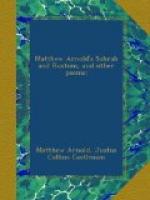=Arnold’s Attitude toward Life=.—Arnold’s attitude toward life has been dwelt upon in the appreciations under the biographical sketch in this volume and need only briefly be summed up here. To him, human life in its higher developments presented itself as a stern and strenuous affair; but he never faltered nor sought to escape from his share of the burden. “On the contrary, the prevailing note of his poetry is self-reliance; help must come from the soul itself, for
“The fountains of life are all within.”
He preaches fortitude and courage in the face of the mysterious and the inevitable—a courage, indeed, forlorn and pathetic in the eyes of many—and he constantly takes refuge from the choking cares of life, in a kind of stoical resignation.” As a reformer, his function was especially to stir people up, to make them dissatisfied with themselves and their institutions, and to force them to think, to become individual. Everywhere in his works one is confronted by his unvarying insistence upon the supremacy of conduct and duty. The modern tendency to drift away from the old, established religious faith was a matter of serious thought to him and led him to give to the world a rational creed that would satisfy the sceptics and attract the indifferent. We cannot do better than quote for our closing thought the following pregnant lines from the author’s sonnet entitled The Better Part:—
“Hath man no second life? Pitch this one high! Sits there no judge in Heaven, our sin to see? More strictly, then, the inward judge obey! Was Christ a man like us? Ah! let us try If we then, too, can be such men as he!”
* * * * *
ARNOLD THE CRITIC
The following extracts on Arnold as a critic are quoted from well-known authorities.
“Arnold’s prose has little trace of the wistful melancholy of his verse. It is almost always urbane, vivacious, light-hearted. The classical bent of his mind shows itself here, unmixed with the inheritance of romantic feeling which colors his poetry. Not only is his prose classical in quality, by virtue of its restraint, of its definite aim, and of the dry white light of intellect which suffuses it; but the doctrine which he spent his life in preaching is based upon a classical ideal, the ideal of symmetry, wholeness, or, as he daringly called it, perfection.... Wherever, in religion, politics, education, or literature, he saw his countrymen under the domination of narrow ideals, he came speaking the mystic word of deliverance, ‘Culture.’ Culture, acquaintance with the best which has been thought and done in the world, is his panacea for all ills.... In almost all of his prose writing he attacks some form of ‘Philistinism,’ by which word he characterized the narrow-mindedness and self-satisfaction of the British middle class.




